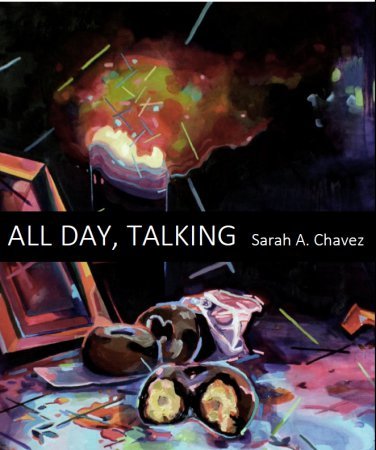All Day, Talking
"This gorgeous, delicate, and sometimes turbulent work exploring transformation is part of a larger examination of similar themes of transformation by today's leading Latino writers. Such works explore evolving and revolving identity . . . I look forward to reading more of Chavez's work."
—Miguel M. Morales, editor Fat and Queer: An Anthology for Queer and Trans Bodies and Lives
"Chavez skillfully weaves the epistolary form into a conjuring of the dead. With grit and wit, she moves through memories like a loved one placing offerings, both lovingly and begrudgingly, on an altar for the Day of the Dead. In this series of irreverent laments, she unflinchingly explores how the distance of difference can cleave through love nearly as brutally as death. Chavez is a keen observer of intimacy and a poeta to be watched."
—T. Jackie Cuevas, Chicana writer & Associate Professor at the University of Texas, Austin
"A stunning, gritty, and beautifully irreverent collection of poems, All Day, Talking repeatedly and necessarily corrupts the conventional elegy. Chavez mourns Carole, yes, but she also mourns herself—and all of us, the tragedy of how we see (or don’t see) one another in our contradictory identities and bodies. If you want to know the honest truth about what it means to grieve and to survive, keep these poems close and listen to this “all day, talking,” which is both deeply personal and profoundly political."
—Stacey Waite, author of Butch Geography
"The story of a friendship, All Day, Talking beautifully, arrestingly, charmingly portrays deep affection (without sentimentality), mourning (without getting maudlin), and devotion (without romanticizing). The poems explore memory and reminiscence with a mix of respect and skepticism, and Carole – who is at the heart of these elegies – becomes an everyday heroine. I love All Day, Talking for its warmth, humor and honesty, and admire it for its insights and wisdom."
—Timothy Schaffert, author of The Perfume Thief
"Chavez’s epistolary poems to a dead beloved, Carole, speak with a conversational familiarity, keeping company with the departed for as long as they can, remaining intimate with her by summoning her presence through memory and fantasy. They’re also bold and generous, giving us the chance to get a glimpse of the beautiful, imperfect world the narrator shared with Carole, to let her live among us, too. All Day, Talking deftly maneuvers through profound sorrow, spikes of anger, and sardonic wit; one poem will delight you with its outright humor, while the next will remind you “it doesn’t matter how loud or late / into the night you call someone’s name, / if they are gone, they are gone.” These are brave poems, vulnerable and tough, that acknowledge the inadequacy of language in the face of death—“the noise that comes from the back / of my throat is just choking, as if a person / could even choke on absence”—and yet remain relentless, sending their missives into that absence, waiting to be heard."
—Jennifer Perrine, author of In The Human Zoo

